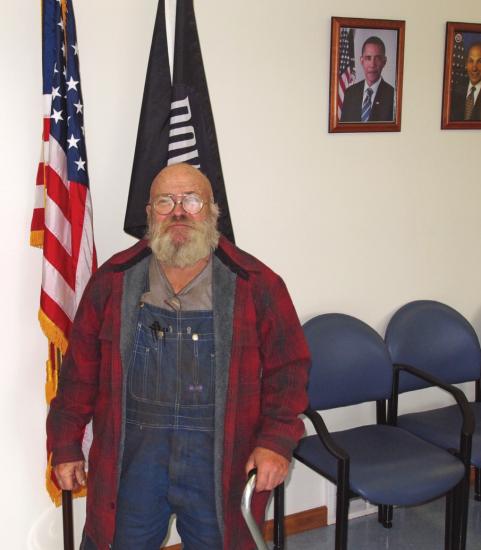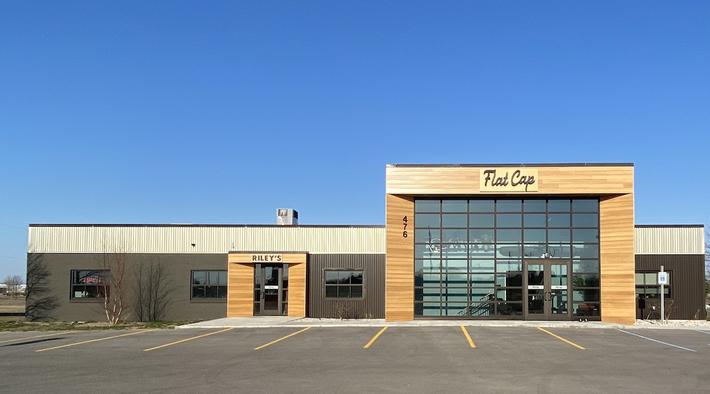VA on the Verge of Change
National Scandal Leads to Changes in Healthcare for Northern Michigan Veterans
Nov. 9, 2014

A scandal that rocked the Department of Veterans Affairs will change the way northern Michigan veterans receive healthcare.
Outrage following reports of excessive healthcare delays at the VA hospital in Phoenix led Congress to pass the Veterans Access, Choice and Accountability Act of 2014 in August, a law that provides billions in funding for better veteran care and also demands reform at the VA.
Some of the revelations that came from the Phoenix VA scandal were horrific; healthcare delays were linked to dozens of patient deaths. While the outcomes haven’t been as dire, the circumstances that surround those tragedies are familiar ones in northern Michigan.
"I certainly wasn’t surprised by what I saw reported," said Charles Lerchen, director of the Department of Veterans Affairs Benzie/Grand Traverse/Leelanau, an organization that works with, but is not part of, the VA. "I saw it with my own two eyes."
NO. 1 COMPLAINT: TRIPS TO
SAGINAW
Local veterans’ main complaint regarding VA healthcare is that they are too often forced to travel downstate for dental or specialized care. In some cases, this could change.
"We are on the verge of a major change in the way the VA provides medical care for the veterans," Lerchen said.
At a Traverse City town hall meeting on Oct. 23, VA brass from Saginaw and Detroit met with a couple dozen vets and advocates who wanted to learn whether access to outside care would increase under the reforms.
In general, vets can expect to get more local care according to Peggy W. Kearns, medical director at the Aleda E. Lutz VA Medical Center in Saginaw. Kearns could not provide specifics, though, as details have yet to be worked out.
"All [of the waiting lists] have been cut down because we’re sending patients into the community," Kearns said. "We’ve always sent patients into the community for care that we can’t provide; we’ll be seeing even more of that this next year."
WHY NOT THE LOCAL HOSPITAL?
Doun Rose, a 67-year-old retired Army Ranger who is 100 percent service-connected disabled, asked why he can’t go to Munson Medical Center rather than travel to Saginaw for specialized care.
"We’ve got a great hospital over here in Munson; people have rated it top 10 percent in the nation, but I’ve got to drive 320 miles to Saginaw," he said. "When are we going to get the same care that [patients] get from Medicaid and Medicare, and now the Affordable Care Act, where we could just go to our local hospital instead of having to drive all that distance?" Kearns said veterans would soon receive a medical care card, but it was unclear how and when that card could be used for local care.
"The law is not that, as far as you get a card and get to go wherever you want," she said.
"So, we’ll still be driving through snow storms to Saginaw every time"¦." Rose said.
Kearns responded, "It depends. It depends on what you need done in an emergency. Most of the laws that go with non-VA care are not going away. The question will be distance and, you know, if it makes sense to send somebody closer to home, then that’s something we can always look at."
SINCERITY QUESTIONABLE
Veterans should not expect to get entirely straight answers from administrators at meetings like the one held at the American Legion hall last month, Lerchen said.
"The VA’s level of sincerity at those town hall meetings is questionable because they’re being forced to do it," he said.
Lerchen, who has been with the county veteran’s office for 24 years, has seen veterans’ access to local care ebb and flow over the years.
For example, until five years ago, a veteran who was eligible for dental benefits could visit a local dentist twice a year for routine care and the VA would pay for it. Then, administrators decided vets should receive care at a VA dental clinic, which meant northern Michigan vets had to travel to Saginaw for this service too.
"I would invite any of the administrators out of Saginaw to take a day off in the middle of February, in the middle of a snow storm, and drive up to Traverse City to get their teeth cleaned," Lerchen said.
RIGHTFULLY FRUSTRATED
Under the new law, the VA is charged with enabling vets to access primary care elsewhere if the VA cannot provide it within 40 miles or 30 days. That will also apply to some cases of specialized care, though the details have not been sorted out.
Outside care from local doctors or specialists when its own clinics were too full or too far away is something the VA could have offered veterans on its own, Lerchen said. Several years ago, VA policy in northern Michigan made it a lot easier for vets to get care at local doctors and hospitals.
"This isn’t anything new. This is the first time the VA has been required by Congress to do it," Lerchen said. "Veterans are very frustrated–and rightfully so."
Part of the problem, Lerchen said, is that the VA has struggled to run a voucher system to pay for care with outside providers in the past.
"That’s what the VA doesn’t know how to do," he said. "I think it will breed its own problems. I can see veterans coming in and saying, "˜The VA told me I could see my own doctor, but I just got sent to collections because they didn’t pay the bill.’" Still, the VA is such a large machine that often the same veteran is frustrated with one thing and pleased with another. Many vets like the Traverse City clinic, for example.
"They certainly don’t like going all the way to Ann Arbor to see a specialist when there’s one here, but when they get their primary care at the Traverse City clinic, they’re happy with that service," Lerchen said. "I have guys that walk out of the Traverse City clinic and say, "˜That was the best doctor’s office experience I’ve ever had.’"
TC CLINIC TO EXPAND–BUT WHEN?
Michael Zaic, a 67-year-old Navy Seal Vietnam veteran who served between 1962 and 1976, said he has been in poor health since 1985 and has gotten the runaround from the VA ever since.
"I probably don’t have many more years in me, the way things are going," he said. "I’m aging real quick from the inside out and the VA really is not doing anything about it."
Zaic makes a distinction, however; he said he is pleased with the treatment he has received at the Traverse City clinic. Yet, demand for service at the Traverse City clinic has exceeded its size. They are running out of space.
Funding was approved to double the Traverse City clinic’s size in 2012, yet nothing happened, Lerchen said.
Kearns said the clinic expansion should begin in April or May and will take nine months to a year to be completed.
"This is being handled out of Washington, D.C., so we’re not doing it out of Saginaw or anything," she said at the town hall meeting.
There are 13,000 vets estimated to live in the three counties served by Lerchen’s office, which sees an average of 400 first-time visits per year.
Besides the Traverse City clinic, other northern Michigan primary care clinics (in military parlance they are called CBOCs for community-based outpatient clinics) are located in Cadillac, Cheboygan, Gaylord and Grayling.
BEAVER ISLAND SOLUTION
The new 40-mile rule for primary care could be tricky in more remote parts of northern Michigan. Beaver Island, for example, is 27 miles away from Charlevoix–over Lake Michigan. From there, the nearest VA clinics are in Traverse City (an additional 50 miles) or Gaylord (another 43 miles).
In the past, "Veterans, in order to get VA care, would either have to take the ferry or a plane from Beaver Island to Charlevoix and get their care from whatever clinic they were enrolled in," said Carrie Seward, VA public affairs officer in Saginaw. "If they needed even just a checkup, they would have to travel, because they chose to live on Beaver Island."
Not so anymore. The day after the Traverse City town hall meeting, the VA delegation traveled to Beaver Island for an open house and to negotiate an agreement with the island’s healthcare clinic for veteran care.
"This is kind of new," Seward said. "It’s another way for us to do rural healthcare."
An upside for the VA is that, in some cases, the cost of providing care through the island clinic will be less than the travel expenses they would have previously had to pay. Seward said there are 90 veterans on the island and half of them are VA enrolled.
"That’s an example of the kind of partnership we’re looking to do," Kearns said. "We’re working with some of our Native American tribes to see what we can do with them.
There are reimbursement agreements that we’re working on with two different tribes right now where they can get reimbursed for taking care of the veteran at the Native American clinic."
BENEFITS DETERMINATION DISABLED
Another common frustration for veterans is the time it takes to receive a determination for disability benefits. To receive benefits, a vet must prove a disability is the result of service. Sometimes that’s easy, many times it’s not. The time it takes to process requests has gotten shorter, however.
Benefits for vets in Michigan are processed in Detroit, which has slashed its backlog of pending requests in recent years, reducing the waiting time, said David Leonard, director of the Detroit VA regional benefit office. That won’t necessarily continue, however.
"It’s a success story, but what’s happened is–and this is the right thing–we were showing amazing, rapid success, but the organization went to a more national strategy," Leonard said. "So that somebody in Michigan doesn’t wait a hundred days while somebody in California waits 500 days. While that might be good for us in this room, it doesn’t make any sense nationwide."
THEY’RE GOING TO PROTECT IT. PERIOD.
Zaic said he found the process of being declared service-connected disabled extremely arduous; he was forced to document and substantiate things that had happened to him years earlier in combat.
"That was very, very hard on me because everybody that I had encountered ended up getting killed," he said.
Rose, who supplements his disability by making custom knives, said he also had a tough time getting certified as disabled. He credits Lerchen with helping him navigate the process.
"Chuck Lerchen was probably the major support on getting my disability," Rose said.
Rose is not optimistic that the changes on the horizon at the VA will mean much to him. He believes the VA’s vast bureaucracy has evolved to protect itself above all else.
"My impression is that those people there have jobs, whether they believe in [the VA] or not, and they’re going to protect it," he said. "Period."
Trending

Springtime Jazz with NMC
Award-winning vibraphonist Jim Cooper has been playing the vibraphone for over 45 years and has performed with jazz artist... Read More >>
Dark Skies and Bright Stars
You may know Emmet County is home to Headlands International Dark Sky Park, where uninterrupted Lake Michigan shoreline is... Read More >>
Community Impact Market
No need to drive through the orange barrels this weekend: Many of your favorite businesses from Traverse City’s majo... Read More >>


